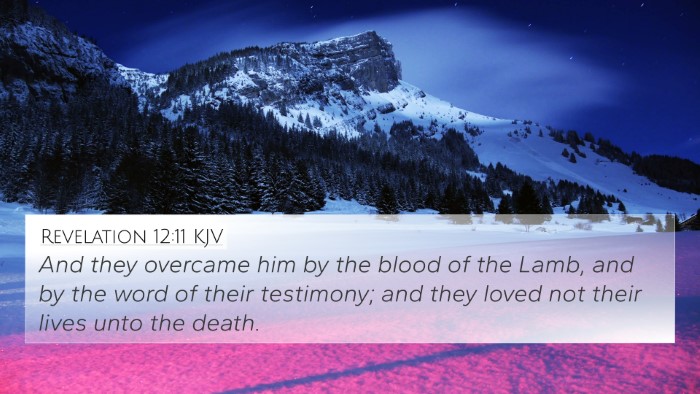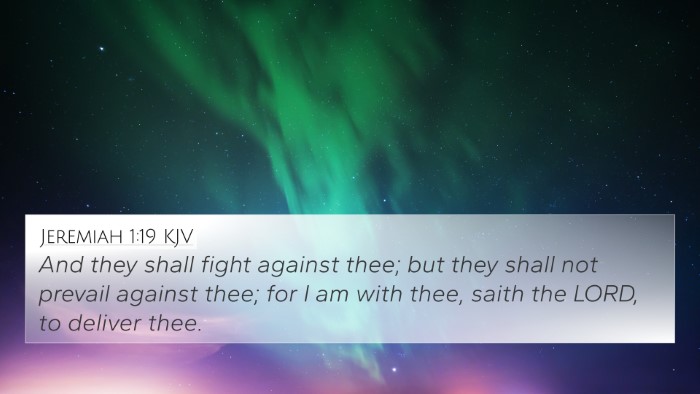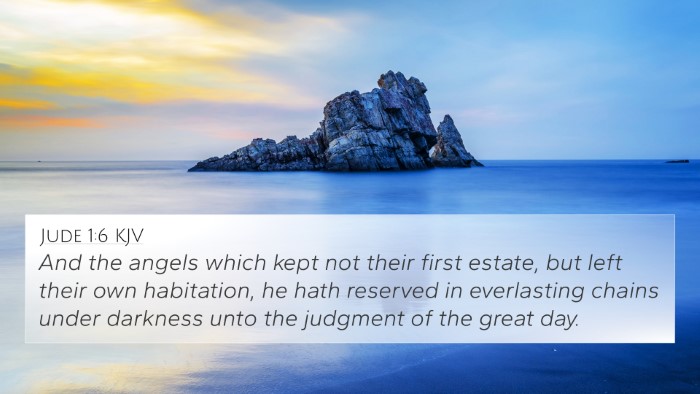Revelation 12:8 states, "But they did not prevail, nor was a place found for them in heaven any longer." This verse discusses the defeat of the great dragon, symbolically representing the defeat of Satan and his forces during the end time.
Meaning and Insights from Public Domain Commentaries
This passage can be examined through the lenses of various public domain commentators, providing a deeper contextual understanding.
Matthew Henry's Commentary
Matthew Henry interprets this verse as a declaration of the ultimate failure of evil and the assurance of God's victory. Henry emphasizes that despite the great power of the dragon (Satan), his attempts to prevail against God and His people will ultimately be futile. This aligns with the overarching theme of Revelation, where God’s sovereignty is vividly depicted, showcasing how Satan and his forces will have no place in the heavenly realm as their defeat is assured.
Albert Barnes' Notes
Albert Barnes notes the significance of the term "prevail" in this verse, indicating that the adversary will not succeed in his endeavors to achieve dominion. Barnes reflects on the eternal consequences of this defeat, highlighting that once cast out, the enemy will no longer have any position in heavenly courts. This serves as a powerful reminder of the ultimate triumph of Christ over spiritual adversities, an element recurrent throughout scripture.
Adam Clarke's Commentary
Adam Clarke offers insight into the cosmic battle depicted in Revelation 12. He portrays this verse as part of a larger narrative illustrating the conflict between good and evil. Clarke emphasizes that the absence of a place for the dragon in heaven symbolizes not just defeat, but also the totality of God’s authority over the celestial realms. The verse reassures believers that evil cannot withstand God's might and that victory is assured for those who stand firm in faith.
Cross-References and Thematic Connections
Revelation 12:8 is intricately connected to various other passages in the Bible, forming a web of cross-references that enrich our understanding of this spiritual warfare. Here are some notable connections:
- Isaiah 14:12-15 - This passage reflects on the fall of Lucifer, echoing the same theme of Satan's defeat.
- Ezekiel 28:17-19 - Discusses the downfall of the mighty guardian cherub, representing the ultimate fate of pride and rebellion against God.
- Luke 10:18 - Jesus states, "I saw Satan fall from heaven like lightning," reinforcing the imagery of defeat and loss of heavenly status.
- John 12:31 - Jesus speaks about the judgment of this world, linking the defeat of Satan with the conclusion of the earthly ministry.
- Romans 16:20 - The apostle Paul assures believers that God will soon crush Satan under their feet, reflecting the assurance of victory.
- 1 John 3:8 - This verse mentions the purpose of Christ's coming is to destroy the works of the devil, aligning with the thematic defeat of evil.
- Revelation 20:10 - This passage speaks of the final outcome of the devil, who is thrown into the lake of fire, sealing his defeat forever.
Understanding the Context of Revelation 12:8
The context of Revelation chapter 12 is vital for understanding verse 8. It presents a vivid picture of spiritual warfare, where the celestial conflict between good and evil is laid bare. This revelatory vision depicts how Satan, denoted here as the dragon, aggressively opposes God’s purposes and the faithful followers of Christ.
Thematic Connections and Cross-Referencing Tools
To delve deeper into the analysis of Revelation 12:8, various tools for Bible cross-referencing can be utilized:
- Bible Concordance - A helpful tool to locate themes and words across the Scriptures.
- Bible Cross-Reference Guide - Guides that provide corresponding verses for comparative studies.
- Cross-Reference Bible Study - Methods that encourage in-depth charting of connected verses and themes.
- Bible Reference Resources - Guides that assist with exploring interconnections in Scripture.
- Tools for Cross-Referencing - Comprehensive materials that help in navigating through various biblical texts for enriching study.
How to Use Cross-References for Enhanced Understanding
Understanding cross-references helps in articulating a more profound comprehension of theological truths. For example:
- Identifying connections between Old and New Testament allows for a holistic picture of God's redemptive plan.
- Comparative study of Pauline epistles highlights how Paul articulates the fights against spiritual forces.
- Links between the Prophets and Apostolic teachings enhance our understanding of continuity in the message of hope.
- Exploring cross-referenced themes in the Bible can illuminate the consistent message of victory God provides His people.
- Interpreting Biblical themes through cross-references emphasizes the richness of scripture as a coherent narrative of God’s glory.
Conclusion
Revelation 12:8 stands as a poignant reminder of the ultimate victory of God over evil. Through the insights of esteemed commentators and the interconnectedness of scripture, believers are assured of their place in God’s eternal kingdom and the futility of the adversary’s efforts. The practice of cross-referencing can significantly enrich one’s study of the Bible, fostering a deeper understanding of God’s word and His promises.

















